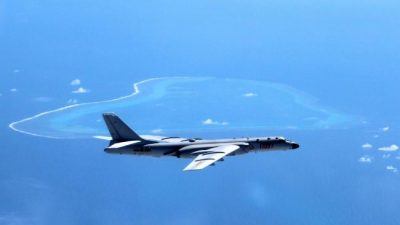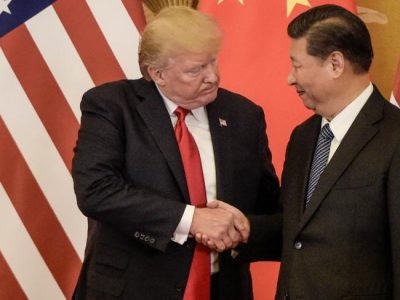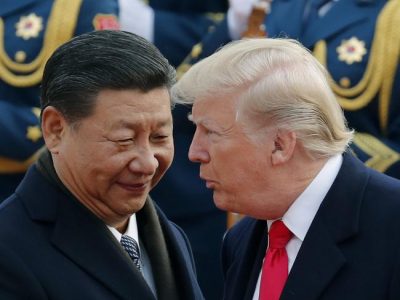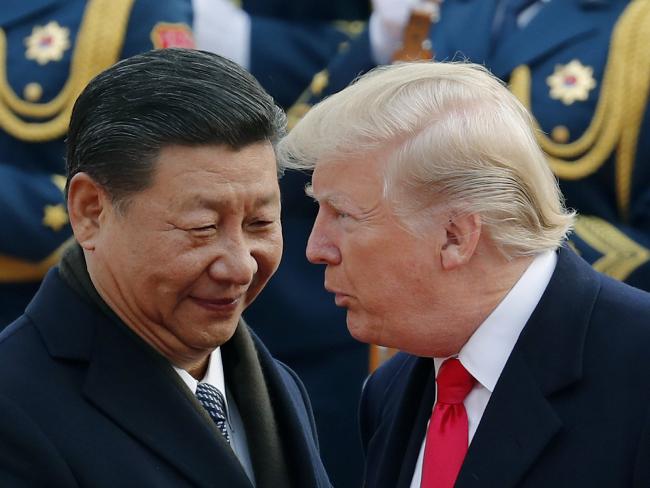US President Donald Trump has been pressuring his Chinese counterpart Xi Jinping to do more to stop North Korea’s missile and nuclear tests. Picture: Andy Wong/APSource:AP
KEY United States allies including Australia have lost faith in their long-term ally as Donald Trump’s America First policy helps shake up the region.
A revealing CNN analysis has found US allies including Japan and South Korea are increasingly looking towards Asian neighbours instead.
Growing uncertainty about America’s commitment and its apparent lack of interest expressed by a US administration are taking hold.
Tensions over the South China Sea, and Washington’s assertion that it has freedom of navigation to the seas have also heightened tensions in the year since Mr Trump took office with a power struggle between the two countries threatening to break out into a larger conflict.
The CNN analysis found Mr Trump’s threats against North Korea and US pressure on China to do more to stop its wayward ally have also increased tensions, while causing concern for Seoul.
DOUBTFUL AUSTRALIA
According to CNN, Australia is “caught in complicated and fractious relationships with both US President Donald Trump and the Chinese government”.
Hugh White, professor of strategic studies at the Australian National University told the US broadcaster the country could be caught between a disinterested Trump and an aggressive China.
Australia’s alliances and its relationship with the US and China were highlighted in a new white paper published last year.
Australia’s foreign policy white paper supports the deep engagement of the US but warns we are facing a more uncertain future and can no longer rely on the security of others.
While not specifically mentioning Mr Trump by name, the paper does state the US President is charting a new “America first” course.
It also revealed while the alliance with the US is central to Australia’s approach to the Indo-Pacific, a rising China is reshaping the region.
“Powerful drivers are converging in a way that is reshaping the international order and challenging Australia’s interests,” it warned.
However, it’s not just Asia — the US is also feeling the pinch. A new Gallup poll has found the world’s approval of the US leadership has dropped to a new low.
‘OWN GOALS’
Senior Analyst in Defence Strategy and Capability at the Australian Strategic Policy Institute, Malcolm Davis, told news.com.au there was an element of truth in the CNN analysis which revealed how the US was losing the region to China.
Dr Davis said the situation has only deteriorated since Mr Trump took office.
“Trump has hit a number of own goals in his first year — the most serious being withdrawing from TPP (Trans-Pacific Partnership),” he said.
Dr Davis added that while Mr Trump was making noises about rejoining the partnership, he only wanted to on his terms. “Of course, the rhetoric he has used in responding to North Korea’s nuclear and missile threats have not helped,” he said.
“Indications are emerging that a trade war with China may be on the horizon.”
Dr Davis pointed out that China was becoming more assertive and ambitious during the Obama Administration, and Barack Obama’s “lead from behind” approach did the US no favours in Asia.
“Obama’s attention was largely focused on the Iran nuclear deal — almost at the exclusion of everything else, which created geopolitical vacuums that China has filled,” he said.
“Trump’s ‘bull in a China shop’ approach to foreign policy at times has accentuated and accelerated China’s growing influence — its ability to get states to realign, as the Philippines has apparently done.”
Dr Davis also said it was worth keeping an eye on Chinese moves in the South China Sea and also in regards to Taiwan, where Chinese military operations were increasing in scope and intensity in terms of aggressive patrolling.
 A Chinese H-6K bomber patrols the islands and reefs in the South China Sea last year — a region which is a flashpoint. Picture: Liu Rui/Xinhua/APSource:Supplied
A Chinese H-6K bomber patrols the islands and reefs in the South China Sea last year — a region which is a flashpoint. Picture: Liu Rui/Xinhua/APSource:Supplied
“At a global level, China seems to be making inroads, alongside Russia, in challenging US and western leadership and undermining the rules-based international order,” Dr Davis said.
“Both are also using soft-power to expand their power (particularly China across Southeast Asia and into Australia) in a manner that diminishes US influence.”
THE CHINA ‘RISK’
Deputy Prime Minister Barnaby Joyce has warned that China and Moscow were the greatest dangers facing Australia today.
Speaking following the release of a new American defence strategy, Mr Joyce agreed with a Pentagon claim that Beijing and Moscow were a greater threat than Islamic State, Nine News reported.
“They don’t have the capacity to take out a nation, or completely wipe out our defence sources,” he said.
“Any nation that does have the capacity to basically overrun you is always a greater threat.”
However Mr Joyce said he didn’t think China was going to do that.
The apparent threat from Beijing was also highlighted in another report published last year which warned Australia was being “wedged” by China and it remained among the biggest risks facing the US-alliance.
Against Complacency: Risk and Opportunities for the Australia-US Alliance also warns there are three other major risks facing a future alliance with the US including domestic politics, costs and a dysfunctional America.
Written by Alliance 21 Fellow Richard Fontaine, the report recommended supporting closer ties between the US and Indonesia and suggested preparing a Plan B for the TPP.
While acknowledging Australia’s close and growing economic ties with China have fuelled domestic prosperity, the report warned it had also created “worrying asymmetric vulnerabilities”.


China and the US both remain powerful players in the Asian Pacific region. Picture: Fred Dufour/AFPSource:AFP
‘STILL IN CHARGE’
Speaking to news.com.au from New York, Senior Vice President of Park Strategies, Sean King, an expert on Asian politics, said he believed talk surrounding America’s Pacific demise was greatly exaggerated.
“While we (US) admittedly and unfortunately pulled back a bit from free Asia during Trump’s first year in office, I’m lately sensing a course correction back in the other direction,” Mr King said.
He said the President mentioned Taiwan in his December 2017 National Security Strategy which was the first time any US leader had done so since 1990.
“Secretary of Defence Jim Mattis last week, while visiting Indonesia, appeared to accept Jakarta’s renaming what had been considered part of the South China Sea, the ‘North Natuna Sea’, and Trump even teased, in Davos, the possibility of our rejoining the Trans-Pacific Partnership,” Mr King said.
“What’s more, Trump’s built a great personal rapport with India’s Narendra Modi, that I think is more viscerally real than his connection with Japan’s Shinzo Abe, as he furthers sours on Indian rival, Pakistan.”
Mr King said other nations including Myanmar and Thailand favouring China didn’t concern him, however he said he hoped Mr Trump was kinder to allies the US deemed important.
“Now, if we can just stop cursing out valued, trusted allies like Australia’s Malcolm Turnbull over the phone, we might actually get somewhere,” he said.
“Fact is, most of Asia, outside of mainland China and a few other places, desperately wants us in Asia and engaged. They love us. We just have to realise that. Slowly but surely, I think we are.”
[email protected] | JANUARY 29, 2018


FAALLOOYIN & FALCELIN